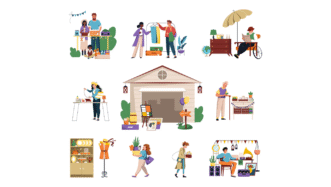LESSON OVERVIEW
This lesson plan is totally British – literally. It focuses on symbols of England such as tea which the video “Why Are Brits So Obsessed with Tea?” by Anglophenia concerns. Thanks to it, your students will have an opportunity to learn more about England as a tea drinking nation and get familiar with idioms and common phrases based on words that refer to some British objects, phenomena and people.
B2 / Upper Intermediate60 minStandard LessonUnlimited Plan
DISCUSSION AND VIDEO
The lesson plan starts with a discussion about symbols and landmarks of England. Therefore, to help students collect some ideas, there is a picture that shows a lot of them. Then, students watch the video and have to find out what given figures and phrases refer to. Before watching the video again, they have choose the correct word to complete the sentences from it. Next, they watch it and check their answers.
ENGLISH IDIOMS
The next part of the lesson plan focuses on very British idioms and common phrases. Firstly, students need to match halves to make common expressions such as not one’s cup of tea, cheap as chips or feel under the weather. Secondly, they have to match them with their meanings. Finally, they work in pairs and have to tell their partner about the last time they had some of the situations given.
Keep calm and drink some tea ☕??
WORKSHEETS
Subscribe to unlock these and many other Standalone lesson lesson plans with the Unlimited plan
Subscribe












Very good but she says, “I think my invitation must have GOTTEN lost in the post.” I’ve never heard a British person say ‘gotten’.
Right, that’s a bit weird. She might have watched too many Hollywod films 🙂
That is right, gotten is used more in America English, but when it is used with a well pronounced Queen’s English it sounds rather British. The more one can add to one’s spoken English the more educated and polite one sounds, you know!
I’m British and I use “gotten” it all the time
Exercise 3 on the worksheet – some of the words are adverbs, not prepositions. E.g. “Invite them over.”
Thanks for the feedback. We’ve changed the instructions for that task and removed the metalanguage not to confuse students. If we put there “prepositions and adverbs”, it might lead to unncessary conversation when these words are considered adverbs and when they are prepositions. There’s an awesome article on Grammar Girl about that case: https://www.quickanddirtytips.com/education/grammar/preposition-or-adverb
Great lesson! You guys do an awesome job listening to customers and changing things when needed. Love this site and lesson)
Awesome! What we do here, we do for you, so listening to your feedback and ideas is super important! After all, ESL Brains wouldn’t exist without all the teachers using it 🙂
Nice lesson! I added a warmer on stereotypes and got them to write down 5 stereotypes about Brits and 5 about Spaniards (home country) which they then discussed before we started. The audio is a bit quick for B1 but I slowed it down to 0.75 on the audio and then it was intelligible for them. Thanks!
Great! Claudia, thank you so much for sharing your feedback and your idea for a warmer with us!
Just loved it! I used this worksheet when it was free, a while ago. Now I’d like to have it again….If only I could have my subscription done, Stan and Justa. I’m from Brazil and it seems I cannot adjust my ‘zip code’ in order to go through the payment.
Thanks, Leticia! We’ve just replied to your message on Instagram 🙂
Interesting!
Great lesson! Very well-organized worksheets and it seemed that you gave a lot of thought process to each lesson. It certainly is showing a lot of insight about Britishers. The lesson is fun, engaging, and interactive. I subscribed immediately after going through the first lesson plan that I saw for free.
Welcome to ESL Brains! We try to make each lesson different and seriously think it through. We see value in having diverse approach to creating teaching materials.
This is excellent! Thanks guys!
Thanks 🙂